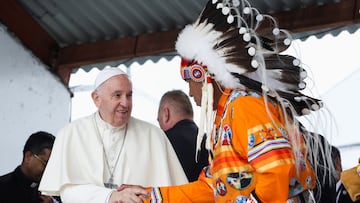What did the Pope apologize for on his trip to Canada?
Pope Francis attended a ceremony of reconciliation where he apologized for the Catholic Church’s role in operating Canada’s Indigenous residential schools.

Pope Francis has issued an historic apology on behalf of the Catholic Church for its role in Canada’s policy of forcibly attempting to assimilate native children into Christian society by removing them from the families and placing them in Indigenous residential schools where abuses were widespread and commonplace. Speaking at the former site of two such schools in Maskwacis, Alberta, the pontiff said he was “deeply sorry” about the Catholic Church’s support for the assimilation policy of previous Canadian governments. The pope has travelled to Canada on a week-long “trip of penance” to ask forgiveness for historical abuses against Native peoples and to uphold a promise to issue an apology on Canadian soil.
The passing of the Indian Act by the Canadian parliament in 1876 paved the way for the institution of the Indigenous residential schools, which were in operation for around 100 years from the 1880s until the latter decades of the 20th century. In total, more than 150,000 native children were separated from their families and enrolled in these schools, where the primary goal of the institutions was to strip them of their language and culture to facilitate their later integration into Christian society. The last residential school closed its doors in 1996.
Many children were starved, beaten and sexually abused in a system that Canada’s Truth and Reconciliation Commission (TRC) has described as “cultural genocide.” In 2021, the terrible history of the Indigenous residential schools gained international notoriety after the discovery of hundreds of unmarked graves on the sites of former institutions. The remains of 215 children were discovered at a former residential school in British Columbia and since then the suspected remains of hundreds more children have been detected at other former residential schools around the country.
Pope Francis “humbly begs forgiveness” for abuses
Speaking on Monday with various Indigenous leaders of the First Nations, Metis and Inuit people and schools survivors in attendance, Pope Francis apologized for Christian support of the “colonizing mentality” of the times and called for a “serious” investigation of the schools to help survivors and descendants heal.
“With shame and unambiguously, I humbly beg forgiveness for the evil committed by so many Christians against the indigenous peoples,” the pontiff added.
A large number of the schools were run for the government by Roman Catholic religious orders of priests and nuns, although Anglican, Presbyterian and United orders also administered schools. The Canadian parliament issued an apology for the system of forced indoctrination in 2008 but Pope Francis’ visit represents the first attempt at reconciliation by the religious institutions involved.
“An apology does not ease the pain of lost children”
“It has been over a year since discovering over a thousand unmarked graves of children on Indian Residential School grounds, and we are still mourning them. An apology does not ease the pain of lost children who never returned home, or the legacy First Nations carry as the survivors, their children, and their grandchildren. However, we encourage the church to move forward in the spirit of reconciliation by making concrete commitments and true reparations going forward,” said Cornell McLean, Acting Grand Chief of the Assembly of Manitoba Chiefs.
Many survivors and indigenous leaders, though, say they want more than an apology. They also want financial compensation, the return of artefacts sent to the Vatican by missionaries, support in bringing an alleged abuser now living in France to justice and the release of records held by the religious orders that ran the schools.
Some also have called for the Catholic Church to renounce 15th-century papal bulls, or edicts, that justified colonial powers taking away indigenous land.
Thousands of children died in Indigenous school system
Efforts to determine how many children died within the residential school system, from illness, starvation and ill-treatment in the form of corporal punishment and sexual and physical abuse, have been made in recent years and although it is extremely difficult to assess the true scale of the tragedy, the TRC archives have documented 4,118 child deaths within the state-sanctioned institutions.
In January, the Canadian government agreed to pay C$40 billion ($31.5 billion) to compensate First Nations children who were taken from their families.
The Canadian Conference of Catholic Bishops has promised to raise C$30 million for healing and other initiatives. The fund has raised C$4.6 million so far.





